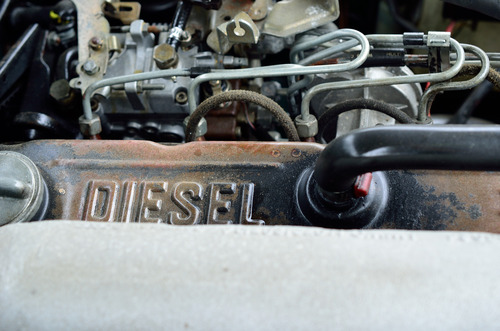Rev up your engines and get ready to supercharge your diesel vehicle’s performance! Living in Sun City, AZ, you rely on your vehicle every day, so it’s crucial to keep it running smoothly. Whether you’re a seasoned diesel owner or new to the diesel world, these performance-boosting tips will help you get the most out of your ride. Plus, make sure to stick around until the end of the post, where we address some of the most common questions about diesel vehicle maintenance to keep you informed and prepared.

1. Maximizing Diesel Engine Efficiency: Essential Maintenance Tips
Your diesel engine is the heart of your vehicle, so taking care of it is essential for optimal performance. Regular oil changes at the recommended intervals are crucial to keep your engine running smoothly. Diesel engines operate at high temperatures, making them more susceptible to wear and tear. By using high-quality synthetic oil, you can protect your engine against heat and friction, extending its lifespan and ensuring peak performance.
In addition to oil changes, maintaining proper fuel quality is key to diesel engine longevity. Contaminated fuel can clog injectors and filters, leading to loss of power and decreased performance. Investing in a quality fuel filtration system can help remove impurities and ensure that your engine receives clean, high-quality fuel for optimal operation.
Regularly inspecting and replacing air filters is another crucial step in maximizing your diesel engine’s performance. Clean air filters help ensure proper air flow to the engine, improving combustion efficiency and overall power output. Neglecting air filter maintenance can result in reduced fuel efficiency, decreased horsepower, and increased emissions, so be sure to check and replace your filters as needed.
2. Boosting Fuel Efficiency: Smart Driving and Maintenance Practices
Improving fuel efficiency is not only good for your wallet but also for the environment. One way to boost your diesel vehicle’s fuel efficiency is by maintaining proper tire pressure. Underinflated tires can increase rolling resistance, forcing your engine to work harder and burn more fuel. Regularly checking and inflating your tires to the recommended pressure can help optimize fuel economy and performance.
Another tip for maximizing fuel efficiency is to avoid excessive idling. Idling consumes fuel without significantly moving your vehicle, so if you anticipate being parked for more than a minute, consider turning off your engine. By reducing idling time, you can conserve fuel, reduce emissions, and improve overall engine efficiency.
3. Maintaining Diesel Engine Systems: Coolant, Fuel Filters, and More
Routine maintenance is key to keeping your diesel engine in top condition. Regularly checking and replacing the fuel filter is essential for engine performance. A clogged fuel filter can restrict fuel flow and lead to engine misfires, reduced power, and increased fuel consumption. By replacing the fuel filter at recommended intervals, you can ensure optimal engine performance and fuel efficiency.
Additionally, monitoring coolant levels and ensuring proper coolant mixture is crucial for diesel engine performance. Coolant helps regulate engine temperature and prevent overheating, so keeping your coolant system in good condition is essential. Regularly check coolant levels, top up if needed, and flush the system according to manufacturer recommendations to maintain optimal engine performance.
4. Turbocharger Optimization: Enhancing Your Diesel Vehicle’s Power
The turbocharger plays a vital role in enhancing your diesel vehicle’s performance by compressing air and increasing engine power. To maximize turbocharger efficiency, it’s important to allow the engine to cool down before shutting off to prevent damage and premature wear. Additionally, regular inspection and cleaning of the turbocharger housing can help prevent obstructions and ensure optimal airflow for peak performance.
5. Improving Acceleration and Throttle Response: Performance Enhancements
Enhancing your diesel vehicle’s acceleration and throttle response can make your driving experience more enjoyable. Upgrading to high-performance fuel injectors can improve fuel atomization and combustion efficiency, resulting in better acceleration and responsiveness. Additionally, tuning your vehicle’s engine control unit (ECU) can optimize performance by adjusting fuel delivery and ignition timing for maximum power output.
6. Safely Boosting Diesel Engine Horsepower: Performance Upgrades
Increasing your diesel engine’s horsepower can provide added performance benefits, but it’s essential to do so safely to avoid damaging your engine. Upgrading to a larger intercooler can help lower intake air temperatures, improving engine efficiency and power output. Tuning your vehicle’s engine control unit (ECU) for increased boost pressure and optimizing fuel delivery can also safely boost horsepower without compromising engine durability.
7. Maximizing Towing Capacity: Essential Upgrades for Diesel Trucks
To maximize your diesel truck’s towing capacity, it’s important to ensure that your vehicle is properly equipped and maintained. Upgrading to a heavy-duty transmission cooler can help prevent overheating and ensure smooth transmission operation when towing heavy loads. Additionally, installing a towing package with the appropriate hitch and wiring can help distribute weight evenly and improve stability while towing.
8. Upgrading Exhaust Systems: Boosting Diesel Vehicle Performance
Upgrading your diesel vehicle’s exhaust system can improve engine performance, fuel efficiency, and overall driving experience. Installing a high-flow exhaust system can reduce back pressure, allowing exhaust gases to exit the engine more efficiently. This leads to improved horsepower, torque, and fuel efficiency. Consider upgrading to a performance exhaust system to unleash your diesel vehicle’s full power potential.
Common Questions About Diesel Vehicle Maintenance
How often should I change the oil in my diesel engine?
It’s generally recommended to change the oil every 5,000 to 7,500 miles, or as specified in your vehicle’s owner manual. Regular oil changes are crucial for maintaining engine performance and longevity.
What type of fuel should I use for my diesel vehicle?
Use the type of diesel fuel recommended by your vehicle manufacturer. Most diesel engines run on standard diesel fuel, but some may require premium diesel or additives to enhance performance and efficiency.
How can I improve fuel efficiency in my diesel vehicle?
Improve fuel efficiency by maintaining proper tire pressure, avoiding excessive idling, keeping your engine well-maintained, and replacing fuel and air filters regularly. Smooth driving and avoiding heavy acceleration also help.
What are the signs that my diesel fuel injectors need maintenance?
Signs include poor acceleration, rough idling, decreased fuel efficiency, and increased exhaust smoke. If you notice these issues, your fuel injectors may need inspection or cleaning.
How often should I replace the air filter in my diesel vehicle?
Air filters should typically be replaced every 15,000 to 30,000 miles, depending on driving conditions. Check your owner’s manual for specific recommendations and inspect the filter regularly for clogging.
Need Expert Diesel Vehicle Care? Contact Us Today!
Maintaining peak performance in your diesel vehicle is essential for both efficiency and reliability. By following these tips and keeping up with regular maintenance, you can ensure your engine runs smoothly and effectively. If you have any questions or need expert assistance with your diesel vehicle, Pete Nelson Automotive is here to help. Contact us at 623-974-4723 to schedule your next car service appointment. Our experienced team is dedicated to keeping your vehicle in top condition, so you can enjoy every mile with confidence.
